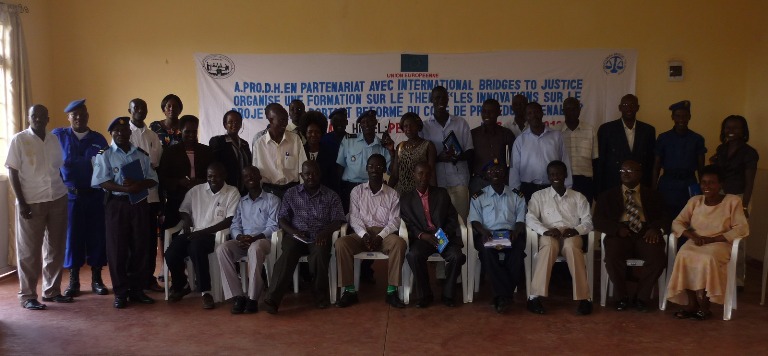
On October 20th, judges, prosecutors, prison officials, police officers, members of the National Assembly and the Senate from Rutana province and lawyers and civil society representatives from Bujumbura came together to discuss the innovations in the Criminal Procedure Code in a roundtable discussion organized in cooperation with APRODH. One of the novelties of this roundtable was the inclusion of members of the National Assembly and the Senate. The goals of the meeting were to discuss the implications of the bill on judicial practice and to come up with recommendations to be submitted to the Parliament of Burundi. Therefore, the attendance of politicians was an important step in ensuring the sustainability of recommendations. The objectives of the roundtable were achieved when all attendees indicated that they would implement the provisions of the new code and their recommendations in their daily practices.
After explaining the major changes and the added value of the new criminal procedure code, the roundtable discussion brought forward some important issues that the criminal defense system in Burundi faces. These included the problem and consequences of incrimination of prosecutors who are accused of illegal detention, the new responsibility of police officers to inform family members of detainees’ whereabouts, and punishment for juvenile offenders. One magistrate explained after the meeting: “The theme of the roundtable discussion was very relevant for legal practitioners because it will help us clarify points that had remained unclear in the criminal process up to this day.” Prison officials learned that the new bill will allow them to release prisoners whose detention warrants are not valid anymore.
Outcomes and recommendations that arose from the discussions were very positive. First of all, increasing awareness of the new code among all actors of the criminal justice system was emphasized as a priority. Public and justice officials advised IBJ to organize these types of activities in all provinces across Burundi. Also, justice officials agreed that magistrates who committed illegal acts, such as torture and illegal detention, should be prosecuted. Furthermore, the need to separate the work of investigating and accusing arrested individuals was pointed out, so that the same prosecutor is not in charge of both investigating a crime and charging and discharging detainees. Lastly, it was agreed that there should be legal provisions to implement and enforce all the new principles of the criminal procedure code.
The meeting had some promising outcomes. Participants saw the need for increased collaboration between the different institutions. A representative from the prison authorities assured that they will work more closely with prosecutors and the high court of Rutana. Referring to the widespread issue of prolonged pre-trial detention, a police officer indicated: “We commit to work better with the prosecution’s office and the court so that the delays are increasingly respected.” Acknowledging the lack of access to legal counsel in this remote province, lawyers committed to providing pro bono legal assistance to detainees in Rutana Province.
At the end of the forum discussion, all participants indicated that the discussions made them reflect upon their work and will influence their day-to-day practice. 94% of them claimed that the discussions made them change their perception of the difficulties encountered by the other actors and their role in the criminal justice process.
Enthusiastic about the discussions, participants pledged to repeat the roundtable discussion across the country, especially members of the Parliament. IBJ’s efforts were acknowledged when one of the participants noted: “I would like to thank IBJ for its noble work, which contributes to the promotion of basic legal rights and legal assistance provided to vulnerable people. I wish IBJ to organize activities across all of the country’s provinces.” It appears that most participants agreed, as they all mentioned they would recommend the roundtable to colleagues and peers. The prison authorities of Rutana have since contacted the Bujumbura DRC to request help with legal assistance for vulnerable detainees. One of the members of Parliament has recommended that IBJ set up a pilot legal aid center in Rutana. Rutana is a “neglected” province where no other NGOs work in the field of criminal defense. IBJ will make sure to fill the gap by organizing a group of volunteer lawyers who will travel to Rutana to assist the accused who are defenseless and thus help the justice system move forward.

Above: Left to right: IBJ Burundi Fellow Astère Muyango, Rutana Senator Muhungu, Governor representative, and APRODH Rutana agent (photo by: Nadege Kwizera) 
Above: a group photo of the participants of the Rutana Roundtable Discussion (Photo by: Nadege Kwizera)